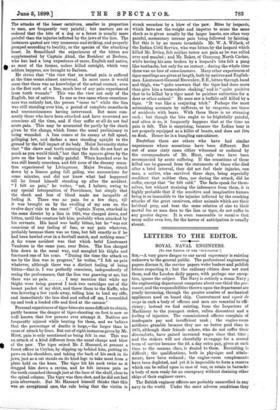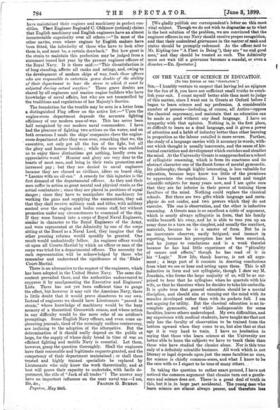LETTERS TO THE EDITOR.
ROYAL NAVAL ENGINEERS.
[To THE EDITOR OF THE "SPECTATOR:']
Sra,—A very grave danger to our naval supremacy is existing unknown to the general public. The professional engineering papers discuss it, the service papers write leaders and publish letters respecting it ; but the ordinary citizen does 'not read them, and the London daily papers, with perhaps one excep- tion, ignore the subject. The Navy is entirely a steam Navy ; the engineering department comprises about one-third the per- sonnet, and the responsibilities thrown upon the department are yearly increasing, through the greater number of mechanical appliances used on board ship. Contentment and esprit de corps in such a body of officers and men are essential to effi- ciency; instead we find existing, from the Inspectors of Machinery to the youngest stoker, sullen discontent and a feeling of injustice. The commissioned officers complain of inadequate pay and insufficient rank ; the engine-room artificers grumble because they are no better paid than in 1875, although their friends ashore, who do not suffer their discomforts, have gained increased wages since that time ; and the stokers will not cheerfully re-engage for a second term of service because the 2d. a day extra pay, given at such time to the seaman class, is denied to them. Recruiting is difficult ; the qualifications, both in physique and attain- ments, have been reduced ; the engine-room complements have been depleted, and yet it is impossible to form a reserve which can be relied upon in case of war, or retain in barracks a body of men ready for an emergency without draining other ships of their engineer crews.
The British engineer officers are probably unexcelled in any navy in the world. Under the most adverse conditions they have maintained their engines and machinery in perfect, con- dition. Fleet Engineer ReginaRIC: Oldknow (retired) claims that English machinery and English engineers have an almost incontestable superiority over all others :—" In most of the other navies, even• where engines by Englitth makers have been fitted, the inferiority of those who have to look after them is, and must be, a certain drawback." But how great is the strain to maintain this perfection may be judged from a statement issued last year by the present engineer officers of the Royal Navy. It is there said :—" This dissatiafaction is of long-standing, affects all ranks and ratings, and, owing to the development of modern ships of war, leads those officers who are responsible to entertain grave doubts of the ability of their department to bear the stress to which, it -must be subjected during actual warfare." These grave doubts are shared by all engineers and marine engine builders who have knowledge of naval affairs, but who are not trammelled by the traditions and regulations of her Majesty's Service.
The foundation for the trouble may be seen in a letter from a distinguished Flag officer on the active list :—" Upon the engine-room department depends the accurate fighting efficiency of our modern men-of-war. This has never been half recognised by .our modern naval commanders. I have had the pleasure of fighting two actions on the water, and on both occasions I made the ships' companies cheer the engine- room department after they were over, remarking that we, the executive, .not only got all the fun of the fight, but all the glory and honour besides ; while the men who enabled us to enjoy these distinctions got nothing, hardly -even an appreciative word." Honour and glory are very dear to the hearts of most men, and bring in their train promotion and increased pay ; but they are denied to naval engineers because they are classed as civilians, idlers on board ship, " Lacers with .an oil-can." A remedy for this injustice is the first demand of the departmental officers. As they and their men suffer in action as great mental and physical strain as the actual combatants ; since they are placed in positions of equal danger; since they have to manipulate the machinery for working the pins and supplying the ammtinition,-they ask that they shall receive military rank and titles, with military control over the engine and boiler rooms staff, but without promotion undefany circumstances to command of the ship.
If they were formed into a corps of Royal Naval Engineers, similar in character to the Royal Engineers- of the: Army, and were represented at the Admiralty by one of the corps sitting at the Board-as a Naval Lord,- they imagine that the other pressing reforms would speedily be granted. One result would undoubtedly follow. An engineer officer would sit upon all Courts-Martial by which an officer-or man of the corps was tried for a departmental offence. The necessity for such representation will be acknowledged by those who remember and understand the significanee of the Blake' CoUrt-Martial.
There is an alternative to the request of the engineers, which has been adopted in the United States Navy. The same dis- content prevailed there, and the authorities endeavoured to suppress it by amalgamating the Executive and Engineers' Lists. There has not yet been sufficient time to gauge the effect, but however it may suit the American Navy, there is little doubt that it would prove disastrous to our own.
Instead of engineers we should have Lieutenants "passed in steam," whose knowledge of machinery would be the hazy memory of a theoretical Greenwich course, and whose action in any difficulty would be the mere echo of an. artificer's promptings. Some-English Navy officers, and even some en- gineering journals, tired of the seemingly endless controversy, are inclining to the adoption of the alternative. But the determination of it should really depend en the public at large, for the supply, of whose daily bread in .time of mar , an efficient fighting and mobile Navy is essential. Let them, however, grasp the question thoroughly. Shall the engineers have their reasonable and legitimate requests granted, and the competency of their department maintained ; or shall these trusted and highly trained specialists be replaced by Lieutenants who only know the work theoretically, and at best will prove their capacity to undertake, with facile de- portment, the role of "Jack of all trades " I The answer may have an important influence on the next naval war.—I am, [We gladly publish our correlpondeat's letter on this most vital subject. Though we do not wish to dogmatise as.to what is the best solution of the problem, we are convinced that the engineer officers in our NavY should receive proper recognition, and that their undoubted grievanees in the matter of :rank and status should be promptly redressed. As the offieeijiaid to Mr. Kipling (see "A Fleet in Being"), they are " no end good men," and they should be treated as such. The Admiralty must, not wait till a grievance :becomes a scandal, or_even a disaster.—ED. Spectator.] , -







































 Previous page
Previous page